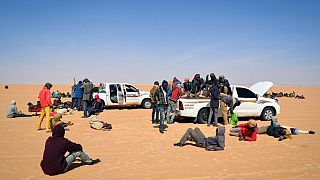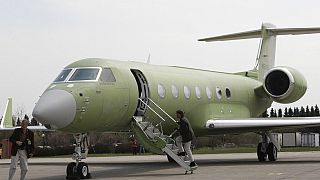Niger
The town of Agadez in Niger is a maze of sandy streets and mud brick houses on the southern rim of the Sahara. For years it has served as a hub in the networks that smuggle people, guns, drugs and food across the desert.
Thousands pay smugglers to make the dangerous journey across the Sahara to Libya. From there, they take their chances with smugglers across the Mediterranean.
The International Organisation for Migration (IOM) expects migration through the Agadez region this year to reach 300,000. That’s more than double the 120,000 it estimates went through in 2015.
Michele Bambassei is a migrant assistance specialist at IOM.
“When you leave Agadez and you enter into Libya, the journey changes a lot. Not just because you have to cross the Sahara desert, which is just the first step, but also because the vulnerability increases and what was before mainly a smuggling network progressively shifts into a trafficking network. So, the exploitative and the abuse part increases. You have to survive in Libya, which is not a given. You have to survive the tension centre in Libya, the security situation in Libya, which is not clearly easy, not even for the Libyans themselves. And then, you have to cross the Mediterranean, so it’s a very dangerous journey,” said Bambassei.
Those who embark on the treacherous journey are constantly at risk of being hijacked by bandits in the desert or being abandoned by smugglers near the Niger-Algeria border.
In spite of the obvious dangers, migrants are still leaving the ancient trading town, often in small groups at night to meet up with 4×4s waiting in the desert.
There is an established path by bus through countries like Mali and Burkina Faso to Agadez, where migrants buy passage from people-smugglers towards Algeria or across the Sahara to Libya. From there, they take their chances with smugglers across the Mediterranean.
Smugglers who ferry migrants across the Sahara take up to $500 a time.
Although home to some of the continent’s fastest growing economies, with the collapse of foreign tourism due to the rise of armed Islamist groups in the Sahara, West Africa is struggling to generate enough jobs for its mushrooming young population.
“We are going in peace, we don’t have anything bad. We’re just going to find something to do as young men. We don’t want to do anything bad, so we have to do better things,” said Ama Tocho, a Nigerian national attempting to migrate to Europe.
“I am trying to finish my journey. From the moment I left Ivory Coast, I have been between life and death. Do you understand? Can you even begin to imagine that a man sits here among pieces of wood to travel more than 2,500 kilometers? But such is life and we pray to God that we arrive safe and sound to our final destination,” said Toure Djibril, an Ivorian migrant.
Today, Libya, still lawless, remains the only viable route to Europe after Algeria, Morocco and the Canary Islands successfully blocked the way. Europe is searching for new ways to close the route.
European politicians worry about the influx of what they call “economic migrants” from Africa, saying more must be done to improve living standards there to stem the flow. But for all those who reach Europe, many more are thwarted along the way. Even those with relatively high education and strong prospects at home don’t give up.
Bombassei says Africa should work on developing more work opportunities for its citizens to encourage them to build themselves at home instead of making the perilous crossing.
“We have to bear in mind that the message is not: don’t go because it’s dangerous. They know better than us that’s its dangerous. The message is: don’t go because we have other opportunities, like migrating regularly or like opportunities for your personal development at home. But now the question is, can we actually say that? Can we actually offer regular ways of migrating to Europe for West Africans? Can we actually say that they have other options in West Africa? This is maybe what we should focus on,” said Bombassei.
In 2014 the government of Niger moved to shut down the old desert migrant routes when 92 people died of thirst after being abandoned by smugglers when the trucks they were attempting to cross the Sahara in broke down.
Many of the migrants travel with nothing, having left all their belongings behind to make the expensive and grueling journey by road across the desert to reach Niger — arriving hungry and penniless.











00:48
Corpses found adrift in boat off Brazil likely migrants from Mauritania, Mali - Police
00:51
Rwandan president meets with UK PM at 10 Downing Street
01:11
UK man runs the length of Africa in 10,000 miles and 352 days
00:59
British man running length of Africa nears finish line
00:47
We are working on ways to support drought-hit African countries- IMF
01:35
Morocco: Rabab Cheddar chases Olympic dreams while fasting Ramadan